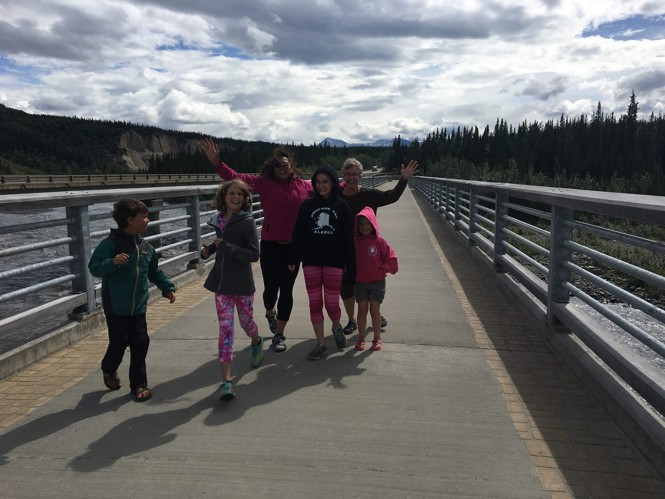Each installment of “The Friendship Files” features a conversation between The Atlantic’s Julie Beck and two or more friends, exploring the history and significance of their relationship.
This week she talks with two women who forged a friendship in crisis. When Sarah’s husband left her for another woman—while she was pregnant—she turned to her colleague Theresa, who was raising a daughter alone. They became so close that when Theresa chose to have a second child, Sarah was there for the birth. They discuss the joy in single parenthood and how they’ve helped each other achieve the lives they truly want.
The Friends:
Sarah Dimmick, 40, an English-language-learning teacher who lives in Fairbanks, Alaska
Theresa Vick, 50, an English-language-learning teacher who lives in Fairbanks, Alaska
This interview has been edited for length and clarity.
Julie Beck: Tell me how you met and became friends.
Sarah Dimmick: I taught English at the same school where Theresa taught English-language learners. She was doing instructional coaching for me. That’s the first memory I have of you, Theresa.
[Read: What teacher friends talk about when students aren’t listening]
My first dramatic memory of you is: We were talking about procreation for some reason and I was like, “I’m thinking about having a baby.” You said, “Sarah, don’t wait. Do it now.” And that is what made me start taking action on getting pregnant.
Theresa Vick: I don’t remember saying that. I wonder how many other people I led down that path.
Sarah: Theresa, you have a lot of power when you really mean something. There are pivotal moments where Theresa says, “You have to do this.” No one else has this effect in my life. Even when Theresa was a stranger, I was like, Okay, this woman has some wisdom.
Beck: What catalyzed a transition from you being friendly colleagues to being friends?
Sarah: When I was pregnant with my second child, my husband told me that he was having an affair with our babysitter.
You can’t skip work the next day if you’re a teacher, because you would have to have sub plans in place. That day I showed up in Theresa’s classroom, and I was just sobbing. She enfolded me right away in a hug, even though she was basically a stranger.
I came to her because Theresa had raised her daughter from a very young age by herself. I needed to see that it was possible to be a successful single parent and a teacher.
Theresa: Sarah’s got this way of entering rooms. Every entrance is dramatic, even if it’s an ordinary day. This was no exception. She knocked on the door; she was beautifully pregnant and sobbing. I was like, Holy cow, because we didn’t know each other very well.
In that situation, you just start triaging. Close the door, lock it, pull down the shade, and get the very pregnant sobbing colleague to a chair. It was meaningful that she had come to me at such a hard time.
Sarah: I just spilled the whole story.
Theresa: I was reeling because she and her husband, from what I had seen, were the couple that you just thought was okay. It was a reminder that everyone has their stories and their griefs.
Beck: Do you feel like that moment cracked it open and it was like, We’re friends now?
Theresa: Oh, for sure. There was a lot of common experience. I was further along down that path, but I still had those unhealthy, broken-record thoughts in my brain that occupied so much energy and time. We were there to let each other know that it’s time to not listen to those anymore.
Certainly we spent more time together outside school after that. One time, she made moose curry and had us over. I was really impressed; I didn’t know she could cook. I was getting to know who she was and what was important to her. In the midst of that devastation, she was still so strong. I mean, she was truly a mess. But she just kept laboring through it.
Sarah: One of the pleasures of being newly single was that we could have grown-up girls’ sleepovers. I would bring my kids over to your house or you would bring yours to mine. It was lovely.

Beck: Tell me about your kids.
Theresa: My oldest is Kaija. She is 16 now, and learning to drive. My youngest, Cere, is 10.
Sarah: I have two children. Daria was a toddler when my life fell apart. She’s 14 now. Corban is the baby I was pregnant with. And he’s 12.
Beck: How did your friendship help you navigate single parenthood?
Sarah: Theresa would always say, “Let’s go for a hike. Let’s go to a music festival.” If I didn’t have that model, I would have just been so sorry for myself: Oh, I’m a single mother, all I do is take care of my children. But just because this happened to me, it’s not who I am. I still get to have joy in my life. That is what Theresa was for me.
[Read: How one friend can change the course of your life]
Theresa: It’s interesting you should say that, Sarah, because there was a single dad who was that for me. He said, “Hey, the world is your oyster. You just put the little toddler in your backpack, and you just keep moving.” I hadn’t realized that was what I’d done for you.
Sarah has helped me to color outside of the lines that I put around myself. One example is—and this is embarrassing to admit—I didn’t know how to dress myself. I had no idea that clothes could help express who you were. She’s a thrift-store shopper, and she started gifting me pieces. Finally I got into the store and she showed me how to do it. What are the rules, Sarah? Never buy anything that doesn’t fit you.
Sarah: I was watching What Not to Wear at the time, so I was using their rules.
Theresa: The other day, another staff person complimented me on what I was wearing. Learning how to dress myself has been a little bit life-changing.
Sarah: Is it time to talk about Cere?
Theresa: I’ve been divorced for over a decade. And Cere is 10 years old. And my kids do have the same father.
There are many griefs when an over-a-decade-old relationship ends. One was that Kaija wouldn’t have a sibling. I kept thinking, “She’s going to be older all by herself, trying to take care of her elderly, separated parents.” I really wanted her to have a sibling, and frankly, another child for myself.
I was dating a little bit, but didn’t find anyone who I wanted to be the father of another child. I still had a congenial relationship with my ex-husband, and I would say, “You get first dibs to be the father, because I think it’d be nice if they had the same father.” For a while, that was not where he was at. But when I was 38, I was like, “Last chance.” And he said, “Okay.”
Sarah: You’ve modeled so much for me. One important thing is: You don’t have to hate your ex. I haven’t gotten to that point yet, but you have. When you split up with your ex, it wasn’t a casual, easy thing. There was true heartbreak. But you chose to see it as: Human beings sometimes do stupid things, but it doesn’t erase their humanity, and they deserve compassion.
You also modeled: This is what I need for myself. And I am simply not going to worry about judgments from people who have nothing to do with me. You are the actualizer of your life. It’s very inspiring.
Theresa: I wanted my ex to be at the birth because it’s his child. I also asked Sarah if she would be there. I don’t run toward hard conversations, so I never got around to introducing them. They’ve hardly even met, and they’re my birth buddies.
Sarah: That morning, I came to your house and everything was so casual. You and your ex-husband were sitting at the table eating some fantastic breakfast. You were glowing and so relaxed. And wearing this fantastic jumpsuit. Then we all made our way to the birth center.
Theresa: I remember laboring and walking along the road, stopping for contractions, and looking at the birds that were coming out from the trees. You were on one side and he was on the other.
Sarah: I was really impressed by him, how he was like, I’m going to be here for Theresa right now, even though you guys didn’t have that deep emotional connection at the time.
But when it came to the comforting touching, that was me. It was such a privilege. How often do we get to do that for another woman? I had had a baby by myself. The memory was so very real of what a person would need.
When the midwife told us it was time, you were like, “Take pictures.” I was the first person to see Cere’s little head come out. She had this round little face, and you could already tell she was so intelligent. I was taking the pictures and sobbing. We feel our humanity in those moments.
Theresa: Asking her to be there felt weird, awkward, unusual. But it also was one of those moments where I’m going to need her. And we’re not going to worry about how it might be awkward. It wouldn’t have been the same experience without her. Would Cere have come out? Yes. The way babies do. But it was much better for Sarah being there.
Beck: Are your kids friends too?
Theresa: We haven’t gotten our kids together that much. Sarah and I sometimes go weeks or months without contact. Up until very recently, she was a single mom and I’m still a single mom. Plus both of us working in education and all the things that life throws out to you.
Beck: Sarah, do you have a partner now?
Sarah: I do. We got married about three years ago.
Beck: Theresa, were you at the wedding?
Theresa: I didn’t plan not to be at the wedding. My family had planned a 30-mile hike in Southeast Alaska, and the dates were fixed. But it was okay for me not to be there.
A day before her wedding, we’re going in opposite directions and we meet in the middle at Denali National Park. All of our kids are with us. The sun is shining and we go for a walk and then I get a little bit teary.
We felt the poignancy of an era ending. Our single parenthood had been so profound in so many ways. Maybe she felt a little bit guilty or like she was leaving this sisterhood. We were walking and she reached out and held my hand. It was very, very sweet but joyful—there wasn’t a sadness to it. Then we got into our cars and she headed to her wedding and I headed for the trail. But that day has always been this shining memory for me.
Sarah: I always think: You birthed me into who I am today.
Beck: What have you learned from your friendship?
Sarah: One more story that illustrates this: I was really struggling with a social situation at work, and I would call Theresa every day and vent. Finally, she was like—this is a quote—“Sarah, I absolutely forbid you to put yourself in this situation anymore.”
She was not giving me advice. She was listening to what I had said over and over again, and reflecting back to me, This is what you actually want. Sometimes we need a friend to tell us what our inner voice is saying.
Beck: It does seem like every once in a while Theresa issues a pronouncement.
Sarah: It’s always what I actually wanted, but didn’t really know how to put into words.
Theresa: It’s taken a long time, I think, to trust in the uniqueness of our relationship. But we truly are able to be honest with each other. Because it’s coming from a place of love, it’s listened to and respected, and it’s not ever hurtful.
Sarah is this very interesting mix of intellect and heart. She feels deeply, she thinks deeply. There’s this mantra that sometimes we pull out: “Don’t believe everything that you think.” If you need to vent, that’s okay. There’s a lot of feeling there. But let’s examine the thoughts that are coming after the feelings, because they’re not accurate.
She holds a mirror up to my situation when I’m seeking direction, and she helps me to see the truth.
If you or someone you know should be featured on “The Friendship Files,” get in touch at friendshipfiles@theatlantic.com and tell us a bit about what makes the friendship unique.



